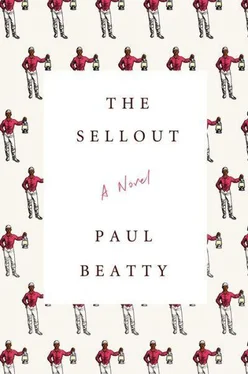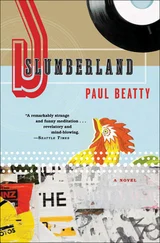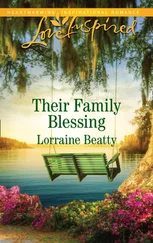As the Dum Dums debated how to mete out a measure of revenge, I adjourned the meeting early by dragging my dad’s body past the drink cooler and placing his corpse on the rear end of my horse, facedown on the rump, like in the cowboy movies, his arms and legs dangling in the air. At first the members tried to stop me. Because how dare I remove the martyr before they had an opportunity for a photo op. Then the police took their turn, blocking the streets with their cars so that I couldn’t pass. I cried and cursed. Circled my mount in the intersection and threatened anyone who came near me with a horseshoe kick to the forehead. Eventually the call went out for the Nigger Whisperer, but the Nigger Whisperer was dead.
The crisis negotiator, Police Captain Murray Flores, was a man my dad had worked with on many a nigger-whispering. He knew his job well enough not to soft-soap the situation. And after raising my father’s head up to look him in face, he spat on the ground in disgust and said, “What can I say?”
“You can tell me how it happened.”
“It was ‘accidental.’”
“And ‘accidental’ means?”
“Off the record, it means your dad pulled up behind plain-clothes officers Orosco and Medina, who were stopped at a traffic light, talking to a homeless woman. After the light changed from green to red a couple of times, your dad zipped around them and, while making a louie, yelled something, whereupon Officer Orosco issued a traffic ticket and a stern warning. Your father said…”
“‘Either give me the ticket or the lecture, but you can’t give me both.’ He stole that from Bill Russell.”
“Exactly. You know your father. The officers took exception, pulled their guns, your dad ran like any sensible person would, they fired four shots into his back and left him for dead in the intersection. So now you know. You just have to allow me to do my job. You have to let the system hold the men responsible for this accountable. So just give me the body.”
I asked Captain Flores a question my father had asked me many times: “In the history of the Los Angeles Police Department, do you know how many officers have been convicted of murder while in the line of duty?”
“No.”
“The answer is none, so there is no accountability. I’m taking him.”
“Where?”
“I’m going to bury him in the backyard. You do what you have to do.”
I don’t think I’d ever seen a cop blow a whistle before. Not in real life. But Captain Flores blew his brass-plated whistle and waved the other officers, Foy, and the Dum Dum Donut protesters off. The blockade parted and I led a very slow-moving funeral procession to 205 Bernard Avenue.
It’d always been my father’s dream to own 205 Bernard Avenue outright. “The Ponderosa,” he called it. “Sharecropping, transracial adoption, and ‘renting to own’ is for suckers,” he liked to say while he pored through real estate and no-money-down investment books, punching imaginary mortgage scenarios into the calculator. “My memoir … that’ll be an easy twenty thousand upfront … We can pawn your mama’s jewelry for five, six thou … and even though there’s an early-withdrawal penalty on your college fund, if we cash that mug out now, home ownership will be right around the corner.”
There never was any memoir, only titles shouted out while he was in the shower fucking some nineteen-year-old bubble-gum-blowing “colleague from the university.” He’d stick his wet head out the door and, through the steam, ask what did I think about “The Interpretation of Niggers” or my favorite, “I’m Ai’ight. You’re Ai’ight.” And there was no jewelry. My mother, a former Jet magazine Beauty of the Week, had no baubles or trinkets on in the faded tearsheet pasted above my headboard. She was a modestly coiffed, curvy expanse of thighs and lip gloss lounging on a backyard diving board in a gold lamé bikini. All I knew about her was the extensive biographical information listed in the bottom right-hand corner of the photo. “Laurel Lescook is a student from Key Biscayne, Florida, who enjoys biking, photography, and poetry.” Later in life I would track Ms. Lescook down. She was a paralegal in Atlanta who remembered my father as a man whom she’d never met, but who, after her one photo pictorial came out in September of ’77, inundated her with marriage proposals, creepy poetry, and Kodak Instamatic photos of his erect penis. Given that my college savings amounted to $236.72, the total take from my sparsely attended black mitzvah, and that both my father’s manuscript and my mother’s jewelry collection were nonexistent, you’d think we’d never come to own that house, but as luck would have it, given my father’s wrongful death at the hands of the police, and the $2 million settlement I’d later received, in a sense he and I bought the farm on the same day.
At first blush, his purchase of the proverbial farm seems the more metaphorical of the two transactions. But as even the most cursory of those early annual inspections by the California Department of Food and Agriculture bore out, to call 205 Bernard Avenue, that two-acre, just-this-side-of-lunar-surface fertile parcel of land in the most infamous ghetto in Los Angeles County with its hollowed-out 1973 Winnebago Chieftain motor home for a barn, a dilapidated-overcrowded-Section-8-henhouse-topped-by-a-weathervane-so-rusted-in-place-that-the-Santa-Ana-winds-El-Niño-and-the-’83-tornado-couldn’t-move-it, medfly-infested-two-tree-lemon-grove, three horses, four pigs, a two-legged goat with shopping-cart wheels for back hooves, twelve stray cats, one cow herd of livestock, and the ever-present cumulonimbus cloud of flies that circled the inflatable “fishing” pond of liquefied swamp gas and fermented rat shit that I pulled out of foreclosure on the very same day my dad decided to tell the undercover police officer Edward Orosco to “move his piece o’ shit Ford Crown Victoria and stop blocking the goddamn intersection!” with funds borrowed against what the courts would later determine to be a $2 million settlement for gross miscarriage of justice, to call that unsubsidized tract of inner-city Afro-agrarian ineptitude a “farm” would be to push the limits of literality. Had me and Pops founded Jamestown instead of the Pilgrims, the Indians would have looked at our wilted, meandering, labyrinthlike rows of maize and kumquats and said, “Today’s corn planting seminar is canceled, because you niggers ain’t going to make it.”
When you grow up on a farm in the middle of the ghetto, you come to see that what your father always told you during morning chores was true: People eat the shit you shovel them. That like the pigs, we all have our heads in the trough. While the hogs don’t believe in God, the American dream, or the pen being mightier than the sword, they do believe in the feed in the same desperate way we believe in the Sunday paper, the Bible, black urban radio, and hot sauce. On his off days, he’d often invite the neighborhood over just to watch me work. Though the Farms was zoned for agriculture, most of the families had long abandoned the salt-of-the-earth farming lifestyle for backyard acreage that featured full-sized basketball and tennis courts and maybe a guest cottage in the corner. And although a few families still maintained chicken coops and maybe raised a cow, or ran an equestrian school for at-risk youth, we were the only family giving full-scale farming a go. Trying to cash in on some forgotten post — Civil War promise. Forty acres and a fool. “This little nigger not going be like the rest of you niggers,” my father would crow, one hand on his dick, the other pointing at me. “My son going to be a Renaissance nigger. A modern-day Galileo out this motherfucker!” Then he’d crack open a bottle of bumpy-face, hand out the paper cups, ice cubes, and splashes of lemon-lime soda, and from the back porch they’d watch me pick strawberries, snow peas, or whatever the fuck was in season. Cotton was the worst. Forget the stooping, the thorns, the droning Paul Robeson spirituals that he played loud enough to drown out the Lopezes’ ranchero music coming from next door, or that planting, watering, and harvesting cotton was a complete waste of time, because the only gin we had was the Styrofoam cup of Seagram’s in his hand, picking cotton sucked because it made Daddy nostalgic. A sentimental drunk and full of gin ’n’ juice pride, he’d brag to our black neighbors how I’d never spent a day in day care or had a sandbox play date. Instead, he swore up and down I was nannied and mammied by a sow named Suzy Q and was the loser in a sibling “piglet versus niglet” rivalry to a porcine genius named Savoir Faire.
Читать дальше












